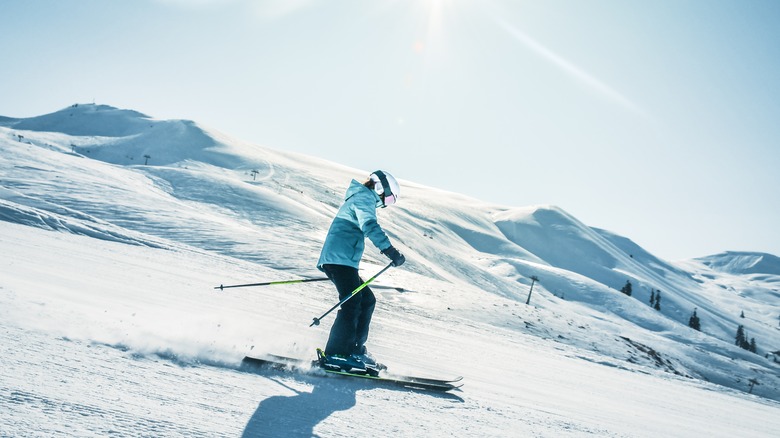The Basic Gear You Need To Start Skiing
Skiing is an exhilerating winter sport that many folks are eager to try. But before you hit the mountains, it's essential to have the right gear. As a beginner, knowing what you actually need can make a big difference in comfort, safety, and performance. With so much gear being marketed to us, it's hard to know where to start. Since skiing is already a costly outdoor sport, we're breaking it down so you can gear up without breaking the bank. These starter essentials will set you up for skiing success.
The most obvious and critical pieces of equipment are your skis themselves. As a beginner, you'll want a pair that's shorter, flexible, and easy to control. This will help you balance better and make smoother turns. Renting is a great option for your first few outings, allowing you to find what works best before making a bigger investment.
To connect you to your skis, you'll need a pair of ski boots. Comfort and fit with ski boots is paramount in avoiding injury. Since ill-fitting boots can ruin your experience, it's worth getting professionally fitted at a ski shop. While you may want to save money by buying second-hand, frankly, ski boots are some outdoor gear you should never buy used. However, you can save money based on what time of year you buy your ski equipment.
Next up are ski poles, which help with balance, timing and steering. Beginners should choose lightweight poles that are suited to their height. To find the right size, flip the poles upside down, grip them below the round basket, and make sure your arms form a 90-degree angle when holding the poles upright.
Essential clothing and gear to keep you warm and safe
Ski clothing is specifically designed to keep you warm, dry, and comfortable while speeding down those gorgeous mountain views. You'll definitely need a good ski jacket and a pair of pants. While you may be inclined to wear your regular winter jacket and snow pants, these are often bulky and won't give you the glide you need. They should be insulated and waterproof, ensuring protection from cold winds, snow, and moisture. These days, some ski clothing even has built-in vents to help regulate your temperature during active skiing.
Cold fingers can quickly ruin a day on the slopes, so investing in a pair of high-quality gloves or mittens is a must. Like your jacket and pants, ski gloves should be warm, waterproof, and offer good dexterity for adjusting gear and holding ski poles.
Safety always comes first, and wearing a helmet is non-negotiable. A good ski helmet will protect your head from injury. In fact, most ski resorts require helmets for lessons, so make this a priority item. Look for a helmet that meets safety standards and fits comfortably over your head, with room for ski goggles.
Ski goggles protect your eyes from snow, wind, and even the sun's harmful UV rays. They also enhance visibility by reducing glare and shielding your eyes from blowing snow, which is essential for a clear view of the slopes.

